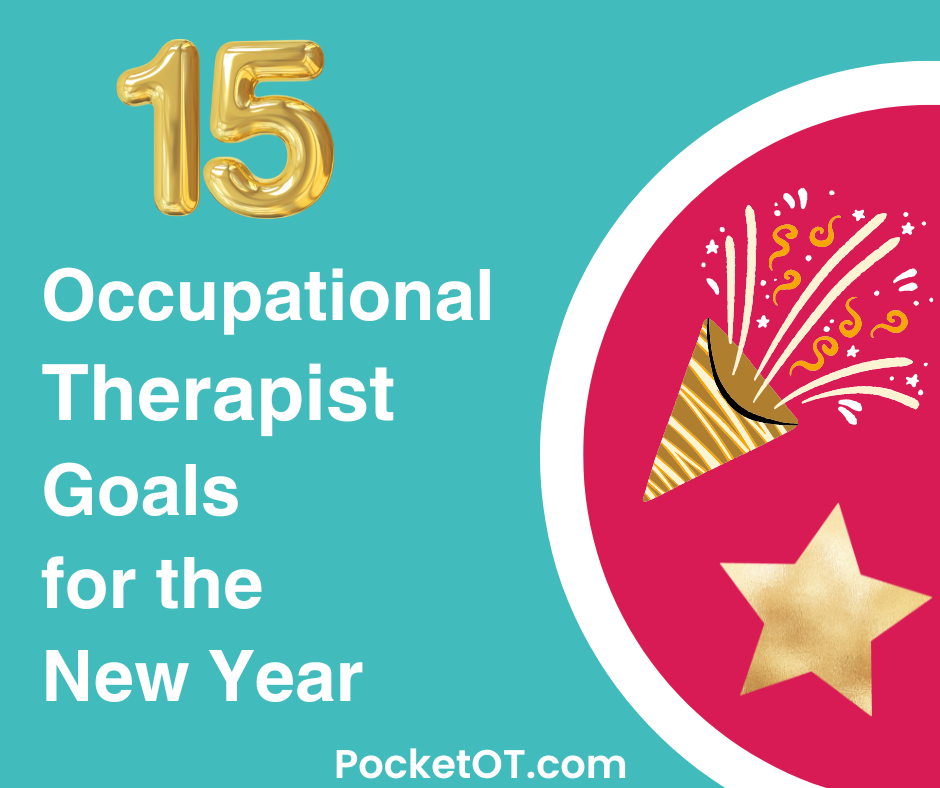
20 Snowman Crafts
Who wants to build a snowman? We do! This week we’ve rounded up some snowman crafts and activities. Each link contains a fun…

Visual changes are powerful reminders. Watching the ball drop last night made me reflect on the last year and dream about the possibilities of a brand new year. Resolutions and goals bring excitement and enthusiasm for what’s to come.
What are your goals? I’m talking about personal and professional goals. All too often, we don’t think about ourselves. Therapists tend to be dedicated and giving, sometimes almost to the point of exhaustion. I’ve met many of you and know from my own experiences that we share our positive energy with our students and clients and go, go, go until we realize we might be getting burned out.
 Here are some of my Out of the POCKET ideas for you:
Here are some of my Out of the POCKET ideas for you:
7. Unsubscribe from unnecessary e-mail lists….not mine, of course! Many of the items in our inbox do not apply to our current lives or are those we subscribed to when we were searching for something in particular. Believe me……I had over 1200 messages in my box before Christmas and feel SO much better now that they are deleted and placed into folders.
8. Go an ENTIRE day without complaining. I know this sounds impossible! Let’s do it together and see how it goes. At a meeting with my fellow OTs, we discussed this and then held each other accountable. Would you believe how wonderful it felt to be a positive thinker? Try it with someone else and then talk about the results at the end of the day!
9. Learn about core muscles and their important connection to ALL things. Distal coordination hinges on proximal stability. Many OTs work on handwriting alone and have not been taught that core muscles must be assessed as part of the evaluation. My book, Sensorimotor Interventions, teaches about vestibular, proprioceptive, core muscles, and the pyramid of learning. It even has hundreds of activities you can do immediately AND a website with helpful information and videos.
10. Negotiate with your employer for benefits, pay raises, continuing education, or time off. Make a list of your strengths and contributions to the company. Request a meeting with your supervisor and discuss it all. It never hurts to try and negotiate!
11. Don’t compare yourself to others. Remember that YOU are doing the best you can. Life is tough and you have taken steps to get to where you are right now. Give yourself some credit for your accomplishments. There will always be someone with more experience so instead of comparing yourself to him/her, try to allow that person to mentor you.
12. Start a blog, e-book, or create a new patient handout. It’s how I started! I created things my students and families needed and then built upon that. Blogs are easy to create and sometimes free! You don’t have to publish your blog, but keep it in an electronic form of a journal. Here’s a link outlining the how-tos of starting a blog.
13. Create a goal bank! I’ve kept mostly every goal for IEPs, treatment plans, and evaluations on an Excel spreadsheet. When you read an evaluation with an awesome goal, write it down. That way, your next plan can include it. No need for me to remind you to maintain HIPAA regulations, right?!
14. Record a video for social media that will help your students OR other therapists. Videos are wonderful tools for patient/caregiver education. I love it when my fieldwork students make a YouTube channel for families. It’s a fun way for them to provide activities that can be shared within your therapy network. I offer free videos as part of my business. My own children or family members have starring roles so I don’t have to worry about patient confidentiality.
15. Have FUN! I know productivity and heavy workloads can cause stress and worry. Try to take deep breaths and focus on why you became an OT in the first place. Do exercises along with your students and add music to your sessions.



